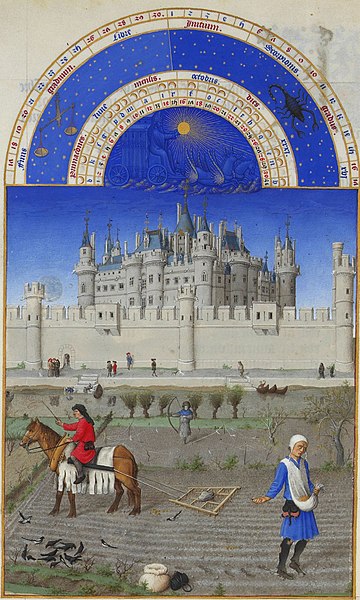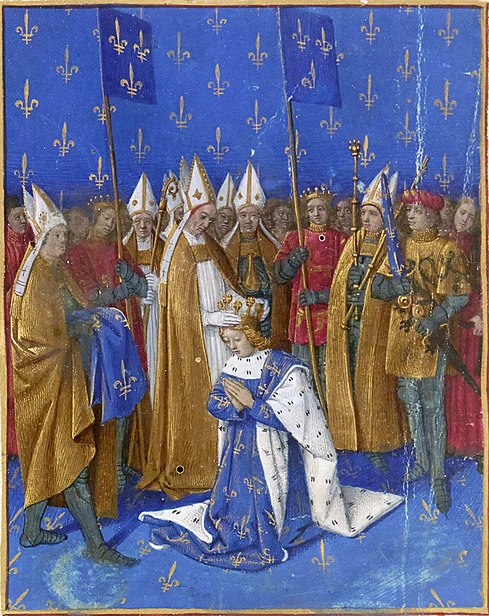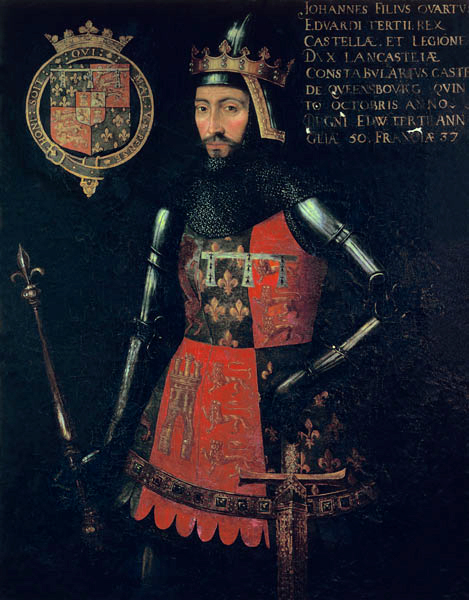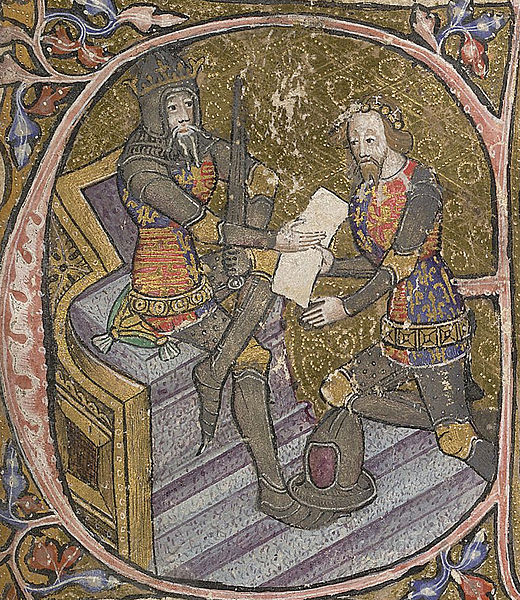 |
| Charles IV |
The Emperor’s Visit
In late
December 1377 the Holy Roman Emperor paid a visit to Paris. Charles V wanted to
tighten ties with the empire and his uncle Charles IV. On 22nd the emperor was
met at Cambrai by French nobles and thence escorted to Paris. Philip was among
those who greeted the emperor on his arrival at Senlis. An attack of gout meant that the emperor entered
France’s capital in a litter.
Charles V
was accompanied by Philip and the Dukes of Bar, Berry and Bourbon and others of the nobility and
officials when he rode to meet his uncle. When the two men were finally able to
be private after the ceremonies that followed;
‘They removed their hats and
spoke together with great friendship and joy of meeting.’[i]
At a state
occasion on January 6th Philip and his brother of Burgundy served
wine and spices to the emperor and their brother after a banquet for 800 guests
and entertainment by minstrels. The company then all transferred to the Hall of
Parlement where a spectacle representing the taking of Jerusalem during the first crusade was on offer.
 |
| The Louvre |
The
following day a boat constructed like a residence with ‘halls, chambers, fireplaces and chimneys’ carried King Charles and
his guest down to the new palace of the Louvre which had been modernised from an ancient fortress. In between all the
festivities the two monarchs held private talks.
The final
occasion for the emperor’s visit was the laying out of the case against
England. Charles V was concerned about
‘The lies the English were
spreading in Germany.’[ii]
He spoke for
two hours tracing the causes of the quarrel but no concrete alliance resulted
from the speechifying or the private talks. The visit did being some benefit;
honouring and enhancing France’s reputation.
Death of a King
In the
summer of 1380 Thomas of Woodstock[iii], decided to take the long way round
to support English troops in Brittany, taking his army through Champagne and
Burgundy. Accompanied by such luminaries as Sir Robert Knollys and Sir Hugh Calveley, Thomas cut a swathe across France, closely shadowed by
French knights and soldiers to hamper foraging. Nevertheless, when the citizens
of Rheims refused to succour them, the English burnt 60 villages surrounding
the city.
 |
| Coronation of Charles VI |
Philip
commanded two thousand knights, ready to ignore Charles V’s order not to engage
in direct confrontation with the English. He was called away from his command
on his brother’s orders. Charles knew his end was nigh and called for his
brothers and his brother-in-law to attend him at his favourite chateau at Beauté-sur-Marne. He was concerned about his part in
the schism in the church and his taxations of his people.
He died on
16th September 1380 and Philip became one of the council of four
regents, made up of the uncles of the new eleven year old king Charles VI, along with the dukes of Berry,
Anjou[iv] and Bourbon. Anjou was to
be regent while Philip and Bourbon were to have the care and personal
guardianship of the young king. According to Froissart, on his death bed
Charles;
‘Desired, that if a suitable
match could be found, that his son Charles should be married to some German
lady. In this way the Germans and the French would be drawn into closer
alliance.’[v]
The three
brothers and Bourbon quarrelled about Charles’ directions and eventually a
compromise was reached wherein Anjou became president of the regency council. Anjou
was more concerned about a projected expedition to Naples where he planned to seize the kingdom. The actual running of
the country was left to Charles V’s officials known as les Marmousets. Philip had control of northern
France while Berry was lieutenant of southern France.
Insurrection in France
 |
| Abbey of St Ouen church |
As Charles V
had feared his brother Anjou’s determined pursuit of money instigated the Harelle tax revolt in 1382[vi]. In January Anjou had
instigated new sales taxes on wine, salt and other commodities[vii]. The order had been
issued secretly and the bidding for the post of tax farmer for these new taxes was held behind
closed doors.
As news of
the new taxes spread riots began in Paris, Laôn, Orléans, Rheims and Amiens.
Anjou refused to rescind the order. Violence broke out in Rouen at the end of
February where the vintners were badly affected by the tax on wine.
 |
| Chateau de Vincennes |
They worked
the crowd into a rage and the crowd responded by attacking priests, Jews,
pawnbrokers and the homes of all the former mayors of the city. The rich Abbey of St Ouen was also attacked. The riot fell
apart with the arrival of the young king and the leaders of Rouen begged
Charles for pardon and Charles was advised to grant it. The town’s liberties
were revoked and a royal bailiff placed in charge.
Even as the
citizens of Rouen were being pardoned, Paris rose up in revolt. On 1st
March a tax collector was killed for demanding monies off a woman selling
watercress at Les Halles. Crowds attacked the Hotel de Ville and removed the arms[viii] stored there before
running amuck in the city. The nobility and the rich fled to Vincennes and the city gates were closed[ix]. The richer bourgeoisie
mobilised a militia to resist both the rebels and retaliation from the crown
Suppression
of the revolt is attributed to Philip; he, the Chancellor and Enguerrand de
Coucy went to the Porte St Antoine to parley with the revolting Parisians who
demanded an abolition of all levies since the king’s coronation and amnesty for
all rioting. On behalf of the crown Philip, Coucy and the Chancellor agreed to
all the demands. Some of the rioters were executed while fines were levied,
while discontent simmered close beneath the surface.
Helping Out the Family
.jpg) |
| Louis de Male |
In 1380 the
people of Ghent rebelled against their liege lord Louis de Male when he imposed
a tax to pay for a tournament he wished to hold. They refused to pay crying out
against the squandering of tax monies on;
‘The follies of princes and
the upkeep of actors and buffoons.’[x]
Louis besieged
rebellious Ghent which overthrew his dominion following an attack by Louis on
the starving city. Louis only evaded capture by exchanging clothes with his
valet.
Philip van Artevelde[xi] the leader of the insurrection
declared himself Regent of Flanders and the region’s towns surrendered to his
rule. Artevelde
gave himself airs and graces, requiring trumpets to announce his arrival,
wearing miniver and scarlet[xii] and dined off the
count’s silver plate seized as booty.
Louis de
Male turned to his son-in-law Philip for help dealing with his rebellious
subjects. Philip invaded Flanders in November 1382 with his nephew the king and
his co-regents at the head of an army of French nobles and their men, estimated
to be up to 50,000 in total. With the army came the Oriflamme[xiii], to indicate to all that the French
were engaged in a holy war.
 |
| Battle of Roosebeke |
The French
defeated the rebel Flemings[xiv] at the battle of Roosebeke on 27th November, during
which Artevelde was crushed to death along with many of his followers. The
young king greeted his victorious warriors and;
‘Welcomed them
joyously and praised God for the victory which, through their efforts, He had
given.’[xv]
Artevelde
had allied with the merchants of England and the following year the pugnacious Hugh le Despenser, Bishop of Norwich[xvi] ostensibly led a crusade to Flanders[xvii]; in reality it was an
expedition by the English in support of the rebels. The expedition was a
failure and Philip took over running the county when his father-in-law died in
1384.
The Peace of Tournai was signed on 18th December
1385. The treaty allowed for Ghent to keep its privileges, there was an amnesty
for the rebels and that Ghent would be free to choose which pope it supported.
However, Ghent was required to give up its treaty with England and recognize
the King of France.
Bibliography
Chronicles –
Froissart, Penguin Books 1968
Europe:
Hierarchy and Revolt 1320-1450 – George Holmes, Fontana 1984
The Fourteenth
Century – May McKisack, Oxford University Press 1997
A Distant
Mirror – Barbara Tuchman, Papermac 1989
Philip the
Bold – Richard Vaughan, Boydell Press 2011
The Flower
of Chivalry – Richard Vernier, Boydell Press 2003
www.wikipedia.en
[i]
A Distant Mirror - Tuchman
[ii]
Ibid
[iii]
The youngest of Edward III’s children
[iv]
Charles was concerned that his brother Anjou would use the French treasury as
his own
[v]
Chronicles - Froissart
[vi]
Anjou’s pursuit of a crown had been forestalled by the murder of Joanna of
Naples; see http://wolfgang20.blogspot.co.uk/2015/04/the-queen-of-naples-ix_29.html
[vii]
To fund his march to Naples
[viii]
3,000 long handed mallets with heads of lead (maillets) used by police which led to the insurrectionists being
known as Mailliotins.
[x]
A Distant Mirror - Tuchman
[xi]
Son of Jacob van
Artevelde, one of the leaders of an insurrection against Louis I of
Flanders in the late 1320s; Artevelde was a merchant
[xiii]
Carried for the first time since Poitiers
[xiv]
Many of whom lacked even basic armour
[xv]
A Distant Mirror - Tuchman
[xvi]
Known as the Fighting Bishop
[xvii]
Flanders and England supported the pope in Rome; at the time the Western
Schism meant that there were two popes, one in Avignon, supported by the
French and one in Rome. Pope
Urban VI in Rome authorised the crusade






